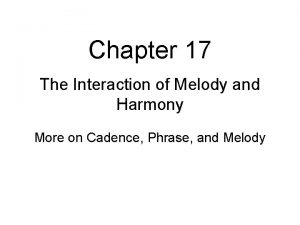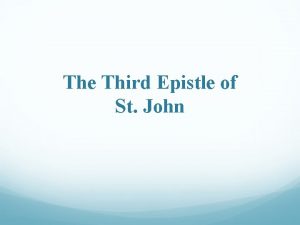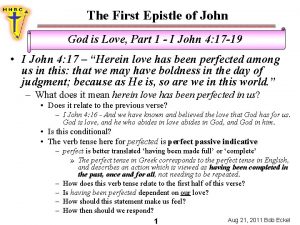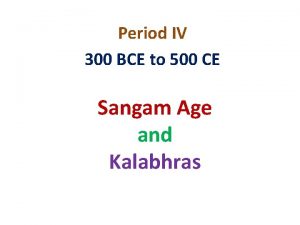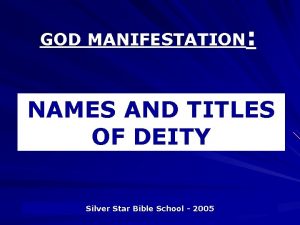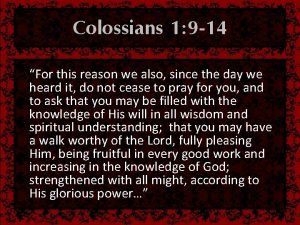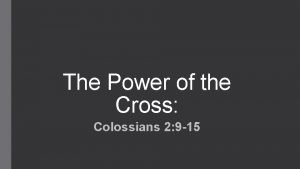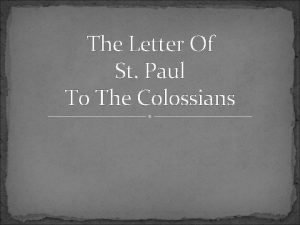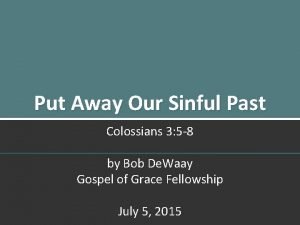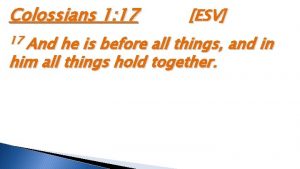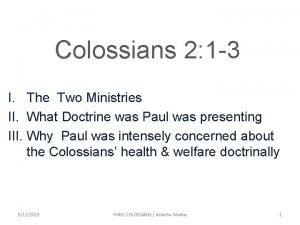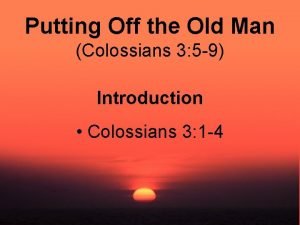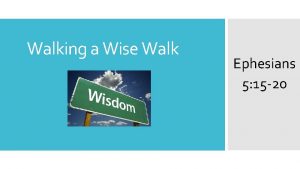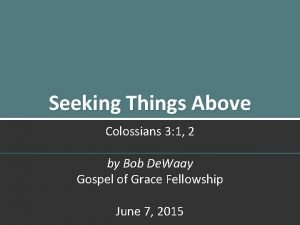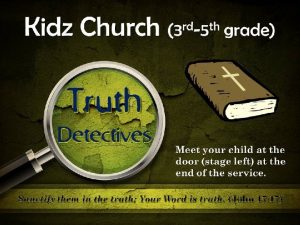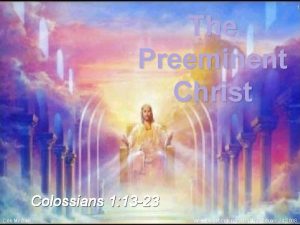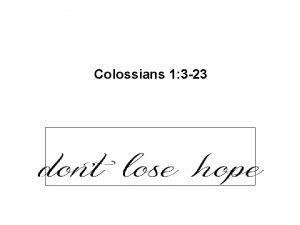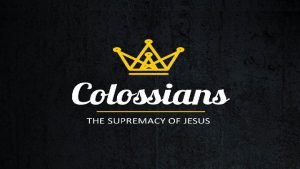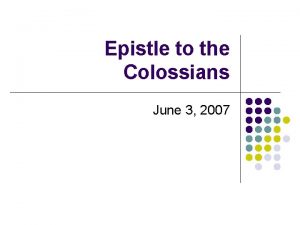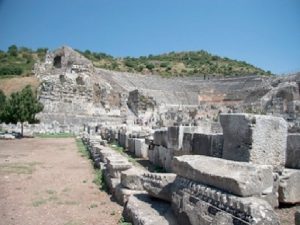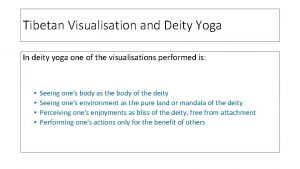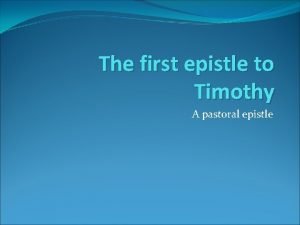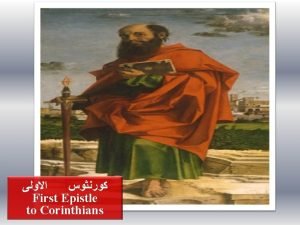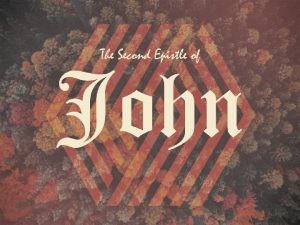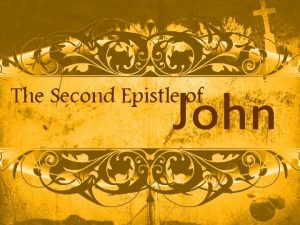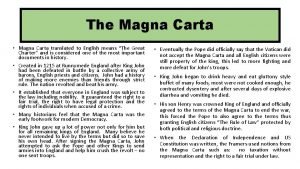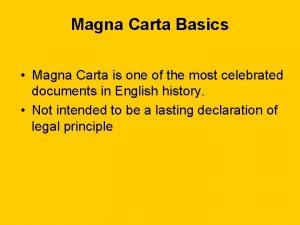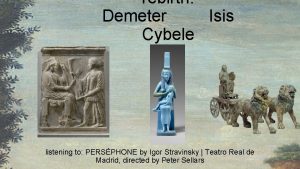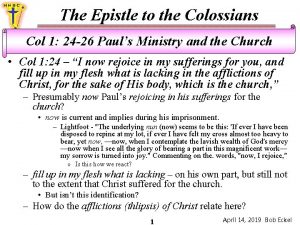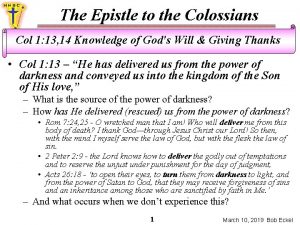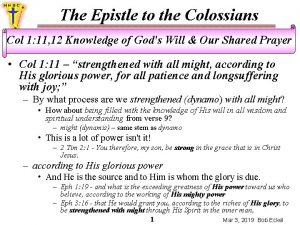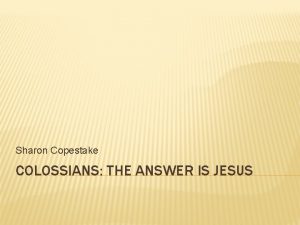The Epistle to Colossians Phrygian deity Cybele Magna

The Epistle to Colossians


Phrygian deity Cybele - Magna Mater

Col 1 Isaiah 55 v 6. come unto you v 11. so shall My word be v 6 bringeth forth fruit v 10. maketh it bring forth v 6 the grace of God in truth v 3. sure mercies v 9 His will v 8. My thoughts v 10. all pleasing v 11. that which I please v 10. being fruitful. . . increasing v 10. bring forth and bud v 11. joyfulness v 12. joy v 14. forgiveness of sins v 7. abundantly pardon v. 15 heaven v 9. heavens 4

Col 1 Parable of the Sower v 6. bringeth forth fruit Mk 4: 20 bring forth fruit v 10. fruitful. . . increasing Mk 4: 18 sprung up and increased v 11. all patience Lk 8: 15 with patience v 11. with joyfulness Lk 8: 13 with joy v 9. spiritual understanding Matt. 13: 23 understandeth 5

Intertextuality: Quotations, allusions, Echoes • criteria for accepting intertextuality ? • specific – rare words • phrases • multiple links • contexts linked • makes sense • The role of the writer? • (did Paul understand? ) • The role of the reader? • (did the Colossians understand? )

Knowledge, wisdom, understanding Col 1: 9 Ex. 31: 3; 35: 31 Pr 2: 6; 9: 10 Isa 11: 2 7

Acts 26: 17 Delivering thee Col 1: 12 ¶ Giving thanks unto from the people, and from the Father, which hath made us Gentiles, unto whom now I meet to be partakers of the send thee, inheritance of the saints in 18 To open their eyes, and to light: turn them from darkness to 13 Who hath delivered us light, and from the power of darkness, Satan unto God, that they may and hath translated us into the receive forgiveness of sins, kingdom of his dear Son: and inheritance among them 14 In whom we have which are sanctified by faith redemption through his blood, that is in me. even the forgiveness of sins:

Colossians Word or phrase Genesis 1: 5 heavens 1: 1, 8 1: 6 All the world earth 1: 1, 10 Bringeth forth fruit Bring forth grass … 1: 11 fruit The day In the day Knew … truth Knowledge of good 2: 9 and evil 1: 8 Spirit of God 1: 9 Day … knowledge of his will All wisdom … understanding In the day that the 2: 4 LORD God made Desired to make one 3: 6 wise 2: 4 1: 2

Colossians Word or phrase Genesis 1: 10 Walk … walking 3: 8 All pleasing God saw … very good 1: 31 1: 12, 13 Light 1… darkness Light … darkness 1: 15 Image of invisible God Let us make man in our image 1: 26 … every creature Every … thing 1: 30 All things … Every thing 1: 31 Created … They were created 2: 4 Heavens … earth Heavens and the earth In the beginning 1: 16, 17 1: 18 Beginning … 1: 4 1: 1

In the beginning <07225> God created 07225 re'shiyth from the same as 07218 (ro'sh) AV-beginning 18, firstfruits 11, first 9, chief 8, misc 5; 51 1) first, beginning, best, chief 1 a) beginning 1 b) first Reshiyth = first: 1 c) chief 1 d) choice part time, generation/harvest, importance

Colossians 1 17 And he is before all things, and by him all things consist. 18 And he is the head <2776> of the body, the church: who is the beginning <746>, the firstborn <4416> from the dead; that in all things he might have the pre-eminence <4409>.

746 αρχη arche from 756; TDNT-1: 479, 81; n f AV-beginning 40, principality 8, corner 2, first 2, misc 6; 4416 ~πρωτοτοκος~ prototokos from 4413 and the alternate of 5088; TDNT-6: 871, 965; adj AV-firstborn 7, first begotten 2; 4409 πρωτευω proteuo from 4413; TDNT-6: 881, 965; v AV-have the preeminence 1;

Colossians Word or phrase Genesis 1: 22 dead Surely die 2: 17 1: 21 Alienated … enemies Hid … eaten … unto dust … wicked works … shalt thou return death 3: 10, 17, 19 1: 22 Body … flesh … death Dust thou art … dust shalt thou return 3: 19 Present you Clothed them 3: 21 1: 23 Every creature Every thing 1: 31 1: 24 Suffering … afflictions Sorrow … sweat 3: 16, 19 His body 2: 23 1: 29 My bones … my flesh Labour … striving … In sorrow … in the sweat of 3: 17, 3: 19 work thy face

Col 1: 27 To whom God would make known what is the riches of the glory of this mystery among the Gentiles; which is Christ in you, the hope of glory: Col 1: 27 To whom God would make known what is the riches of the glory of this mystery among the Gentiles which is Christ in you The hope of glory.

Colossians Word or phrase Isaiah 45 1: 16 created. . . heavens. . . created. . . earth heavens. . . earth v 18 1: 17 by him all things consist I the LORD do all these things v 7 1: 26 the mystery hid from ages hidden riches in secret places v 3 1: 26 Now made manifest I have not spoken in secret v 19 1: 27 God would make known That they may know v 6 the riches of the glory the treasures of darkness . . . v 3 and shall glory v 25

Colossians so far! 1: 1 - 1: 8 God’s Word (the Gospel) sent forth to create fruitfulness (Isaiah 55). 1: 9 - 1: 14 Prayer for the Spirit gifts to be given to the Colossae ecclesia so that their spiritual development might come to fruition (Exod 35). 1: 15 -23 The New Creation brought into being through the redemptive work of Christ (Genesis 1). 1: 24 -29 The ministry of the Apostle Paul in the Gospel - the minister to the body(the ecclesia) of the second Adam (Genesis 2, Isaiah 45). 2: 1 -23 The destructive effect of the Judaistic teaching on the 17 body of Christ (Genesis 3).

Colossians Word or phrase Genesis 2: 4 Beguile … enticing Beguiled me 3: 13 2: 8 deceit Ye shall not surely die 3: 4 2: 18 Beguile you Beguiled me 3: 13 2: 19 Head … body Made he a woman 2: 22 2: 21 Touch not, taste not, handle not Not eat … touch 3: 3 2: 22 perish Thou shalt surely die 2: 17 2: 23 Shew of wisdom More subtil 3: 1 3: 9 Old man Dust thou art 3: 19

Colossians 2: 8 the tradition of men 2: 22 perish Isa 29: 13 Isa 29: 14 2: 22 the commandments and doctrines of men Isa 29: 13 Isaiah 29: 13, 14 “Wherefore the Lord said, Forasmuch as this people draw near me with their mouth, and with their lips do honour me, but have removed their heart far from me, and their fear toward me is taught by the precept of men: Therefore, behold, I will proceed to do a marvellous work among this people, even a marvellous work and a wonder: for the wisdom of their wise men shall perish, and the understanding of their prudent men shall be hid. ”

Zeitgeist From Wikipedia, the free encyclopedia Eph 2: 1 -3 The Zeitgeist (spirit of the age or spirit of the time) is the 1 ¶ And you hath he quickened, who were dead in intellectual fashion or dominant school of thought which typifies and trespasses and sins; influences the culture of a period. For example, the architecture and other art of the twentieth century was much influenced by the idea of 2 Wherein in time past ye walked according to the modernism. [1] The German word Zeitgeist is often attributed to the course of this world, according to the prince of philosopher Georg Hegel but he never actually used the word. In his the power of the air, the spirit that now worketh works such as Lectures on the Philosophy of History, he uses the phrase der Geist seiner Zeit (the spirit of his time)—for example, "no in the children of disobedience: man can surpass his own time, for the spirit of his time is also his own 3 Among whom also we all had our conversation in spirit. "[2] Other philosophers who were associated with such ideas times past in the lusts of our flesh, fulfilling the include Herder and Spencer and Voltaire. [1] The concept counters the Great Man theory popularised by Thomas Carlyle, which sees history desires of the flesh and of the mind; and were by as the result of the actions of heroes and geniuses. nature the children of wrath, even as others.


Humanism Humanist Manifesto II • “… But we can discover no divine purpose or providence for the human species. While there is much that we do not know, humans are responsible for what we are or will become. No deity will save us; we must save ourselves. ” • science affirms that the human species is an emergence from natural evolutionary forces. As far as we know, the total personality is a function of the biological organism transacting in a social and cultural context. There is no credible evidence that life survives the death of the body. We continue to exist in our progeny and in the way that our lives have influenced others in our culture.

Humanist Manifesto II • We affirm that moral values derive their source from human experience. Ethics is autonomous and situational needing no theological or ideological sanction. Ethics stems from human need and interest. To deny this distorts the whole basis of life. Human life has meaning because we create and develop our futures. • We deplore the division of humankind on nationalistic grounds. We have reached a turning point in human history where the best option is to transcend the limits of national sovereignty and to move toward the building of a world community in which all sectors of the human family can participate. Thus we look to the development of a system of world law and a world order based upon transnational federal government.

Scientists and humanists fear creationist teaching is set to creep into more classrooms By Andrew Williams Thursday, 7 April 2011 Last summer the British Humanist Association co-ordinated a letter from scientists and educators to Michael Gove, the Education Secretary, urging him to specifically include the teaching of evolution in the primary schools curriculum. The Department of Education's reply indicated that this would be too prescriptive. However it went on to discuss creationism and intelligent design (ID), saying that, because they are not scientific, they do not form part of the national curriculum and should not be taught in science class … Dr Behe believes that although the scientific community is presently allergic to ID, this will change after a generation or two. "As scientists retire, " he says, "the ones who are very antagonistic to ID will be replaced by those other scientists who have grown up hearing and wondering about it. And so I think that the atmosphere will change. " His prediction illustrates why the education of children has become a battleground between ideologies, and why applications to set up free schools by organisations such as Everyday Champions Church will continue to remain in the spotlight. Last summer the British

A Post-Modern World? • Postmodernism “holds that there is no truth, no basic right or wrong, nothing good or bad, nothing evil or noble, nothing moral or immoral. ” James Dobson (2003)


A reflection on humanism in the 21 st century Background document prepared for UNESCO-Nishan Forum, 16 April 2012 The Director-General of UNESCO has proposed to respond to the challenges of our times through the lens of a New Humanism for the 21 st century. Why do we need a New Humanism? The ideals of peace, tolerance and dialogue, the principles inscribed in the United Nations Charter, the Constitution of UNESCO or the Universal Declaration of Human Rights, all stem from humanistic values which can be identified throughout human history on all continents. They also form the basis for international cooperation as embodied in such global agendas as the Millennium Development Goals (MDGs) or the Education For All (EFA) goals. Humanism is UNESCO’s moral and intellectual DNA. The evolutionary philosophy of UNESCO embraces a profound optimism vis-à-vis the notions of human development and progress. In an era when the human population has reached 7 billion individuals, the belief that humanity can and does progress is an inspiration.

Col 3: 1 ¶ If ye then be risen with Christ, seek those things which are above, where Christ sitteth on the right hand of God. Col 3: 24 Knowing that of the Lord ye shall receive the reward of the inheritance: for ye serve the Lord Christ. Psa 110: 1 ¶ « A Psalm of David. » The LORD said unto my Lord, Sit thou at my right hand, until I make thine enemies thy footstool. Acts 2: 34 -36 … The LORD said unto my Lord, Sit thou on my right hand, Until I make thy foes thy footstool. Therefore let all the house of Israel know assuredly, that God hath made that same Jesus, whom ye have crucified, both Lord and Christ.

What is the link between the New Creation theme and Psalm 110: 1? Eph 1: 20 Which he wrought in Christ, when he raised him from the dead, and set him at his own right hand in the heavenly places. . . 22 And hath put all things under his feet, and gave him to be the head over all things to the church, Psa 110: 1 ¶ « A Psalm of David. » The LORD said unto my Lord, Sit thou at my right hand, until I make thine enemies thy footstool. Psa 8: 6 Thou madest him to have dominion over the works of thy hands; thou hast put all things under his feet:

Colossians Word or phrase Genesis 3: 10 New man … In the image of 2: 24 knowledge … God created he image … created him 3: 18 Wives … husbands Man … wife 2: 24

Col 3: 18 ¶ Wives, submit yourselves unto your own husbands, as it is fit in the Lord. 19 Husbands, love your wives, and be not bitter against them. 20 Children, obey your parents in all things: for this is well pleasing unto the Lord. 21 Fathers, provoke not your children to anger, lest they be discouraged. 22 Servants, obey in all things your masters according to the flesh; not with eyeservice, as menpleasers; but in singleness of heart, fearing God: 23 And whatsoever ye do, do it heartily, as to the Lord, and not unto men; 24 Knowing that of the Lord ye shall receive the reward of the inheritance: for ye serve the Lord Christ. 4: 1 ¶ Masters, give unto your servants that which is just and equal; knowing that ye also have a Master in heaven.

Colossians 1: 1 - 1: 8 God’s Word (the Gospel) sent forth to create fruitfulness (Isaiah 55). 1: 9 - 1: 14 Prayer for the Spirit gifts to be given to Colossae so that their spiritual development might come to fruition (Exod 35). 1: 15 -23 The New Creation brought into being through the redemptive work of Christ (Genesis 1). 1: 24 -29 The ministry of the Apostle Paul in the Gospel - the minister to the body(the ecclesia) of the second Adam (Gen. 2, Isa 45). 2: 1 -19 The contrast between the legalistic false teaching and the atoning work of the Lord (Gen. 3). 2: 20 -23 The challenge - “if ye be dead. . . ” (Isa 29). 3: 1 -7 The challenge - “If ye then be risen with Christ. . . ” (Psa 110: 1) 3: 8 -4: 1 Implications of the New Life in Christ. 32

Laodicea

LAODICEA

• Rev 16: 15 Behold, I come as a thief. Blessed is he that watcheth, and keepeth his garments, lest he walk naked, and they see his shame. 3: 1 ¶ And unto. . . Sardis write. . . thou 14 ¶ And unto. . . Laodiceans write. . . hast a name that thou livest, and art dead. 15 thou art neither cold nor hot: I would 2 Be watchful, and strengthen the things thou wert cold or hot. which remain, that are ready to die: for I 16 So then because thou art lukewarm, and have not found thy works perfect before neither cold nor hot, I will spue thee out of God. my mouth. 3 Remember therefore how thou hast 17 Because thou sayest, I am rich, and received and heard, and hold fast, and increased with goods, and have need of repent. If therefore thou shalt not watch, I nothing; and knowest not that thou art will come on thee as a thief, and thou wretched, and miserable, and poor, and shalt not know what hour I will come upon blind, and naked: thee. 18 I counsel thee to buy of me gold tried in 4 Thou hast a few names even in Sardis the fire, that thou mayest be rich; and white which have not defiled their garments; raiment, that thou mayest be clothed, and they shall walk with me in white: for that the shame of thy nakedness do not they are worthy. appear; and anoint thine eyes with eyesalve, that thou mayest see.
- Slides: 35
